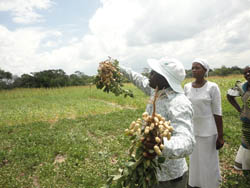In the eight districts where N2Africa is working in Zimbabwe, farmers are expanding the area they put under legumes. Farmers are increasingly aware of the importance of legumes for enhancement of soil fertility, but also the nutritious protein provided by legumes and their profitability as compared with other crops that were previously prioritised in the districts.
For example in Guruve, where the N2Africa project has been operational in five wards in the last two seasons integrating the activities of the IFAD-funded project run by CIAT on supporting marketing of legumes, farmers noted the importance of growing sugar bean in their fields and almost all farmers have planted the crop. Notably, farmers in these wards have grown more sugar beans than the country’s staple crop, maize. Areas planted with beans range from 1 to 5 hectares.
Being prompted by the variability of the season in the past few years, the farmers have noted the potential of legumes, which are short season crops, beneficial in crop rotation and provide good opportunities as a cash crop since the crop is cheap to produce and the price is lucrative. There is always a ready market for sugar beans in Zimbabwe.
 |
 |
|
Mr. Karambwe and his mother receiving a knapsack sprayer on a field day in Guruve |
Mr. Isaac Chabata (N2Africa Farm Liaison Officer) showing the numbers of pods on groundnut in Chegutu District |
"We have realised that bean production is a profitable enterprise as compared to maize hence farmers have planted large areas of the crop this season", said Stanley Nyamakato, an N2Africa Lead Farmer in Guruve district. He continued to explain that farmers have learnt the profitability of legume enterprise after N2Africa implemented the project in the last season. In Guruve, as in many other places in Zimbabwe, farmers are faced with serious cash constraints, particularly at the beginning of the agricultural season. Therefore numerous farmers used retained seed from last season, but despite the challenges, some other farmers managed to buy the seeds themselves, for example from agro-dealers in the district.
Notwithstanding the very late start of the current season and the continued erraticness of the rains, the production seems promising. Hence the next challenge is marketing. Last season, Byron Zamasiya (Liaison Officer for the IFAD-funded project), facilitated marketing of common beans from Guruve. The total amounts available for marketing from Guruve are likely to be much larger. Although this makes collective marketing easier, the road network in Guruve is in such a bad state that transporters are often hestitant to travel to the district with their trucks and if they do, they charge much higher prices.
Meanwhile, field days have commenced in all districts. These field days provide an opportunity for farmers to showcase their achievements and for those who were not in the project to learn about biological nitrogen fixation and its importance for soil fertility. Of equal importance is that these field days have proven to be a great opportunity to put the project into spotlight of government officials. Local authorities in the different districts were invited and most of them were the guests of honour at the functions. Particularly the field day in Mudzi district was a great success after the N2Africa staff had been facing challenges to implement field activities during the season. This is illustated in the next article.
Isaac Chabata
